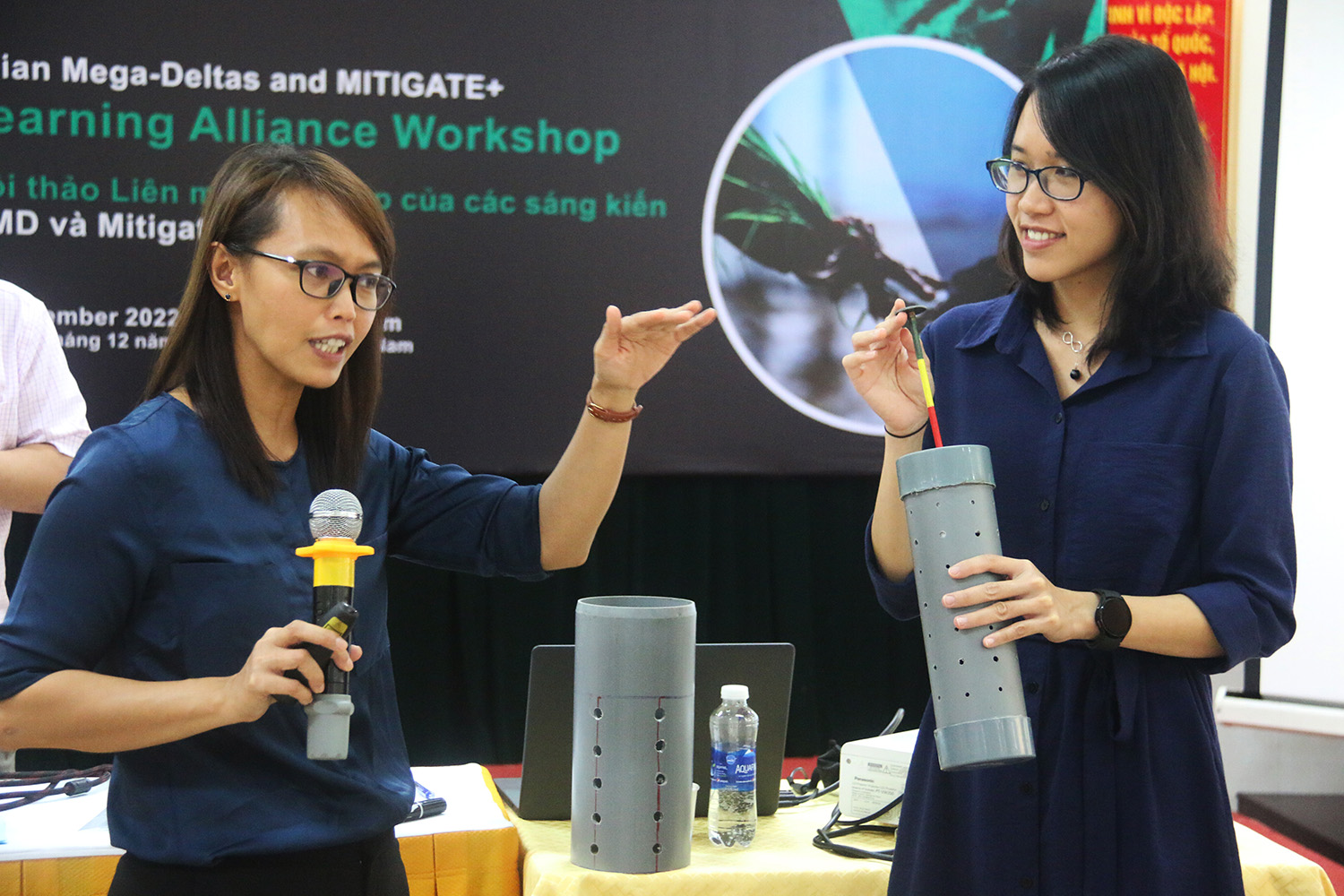Building a Learning Alliance for Living Labs in Vietnam’s Mekong Delta

A collaboration between the CGIAR Initiatives on Asian Mega-Deltas (AMD) and Low-Emission Food Systems (Mitigate+), a Learning Alliance for Living Labs workshop was organized by the International Rice Research Institute (IRRI) in Can Tho City, Vietnam on 6 December 2022 to form a network of diverse stakeholders within the region, that has an interest to address climate-related issues in the Mekong Delta.
In her opening remarks, Dr. Katherine Nelson, climate change specialist at IRRI and work package leader for both AMD and Mitigate+, shared that the goal of the workshop is to “form a province-level learning alliance and innovation network to help identify and co-create good practices to adapt to and mitigate climate change.” She also elaborated on the concept of ‘Living Labs for People’, which is a participatory action research approach to engaging and supporting stakeholders and partners in important food systems to co-design, tailor, and test integrated innovation packages to reduce greenhouse gas sources and enhance sinks while improving social equity.
The core members of the Learning Alliance for Living Labs included researchers and experts from IRRI as facilitators and was attended by various stakeholders representing: local government agencies, specifically focusing on plant protection, extension, and irrigation services; farmer groups and cooperatives, including rice and non-rice crops; private sector, specifically input suppliers and service providers, contractors, and fertilizer companies.

Facilitating the workshop, Dr. Rica Joy Flor, Innovation Systems Scientist in IRRI Cambodia, shared the various steps that need to be undertaken in the workshop, such as: causal analysis through problem trees, opportunities assessment, prioritizing opportunities of interest, stakeholder assessment, and the visioning exercise.
For the problem tree and opportunities assessment, Dr. Flor requested the participants to identify the main production constraints due to climate impacts that they have experienced and to elaborate on why these problems are happening. The main problems outlined were on drought, salinity intrusion, and lack of irrigation water, degenerated soil, high input and labor cost, pests and diseases, and low selling price, among others. The private sector group identified greenhouse gas emissions from rice production as a critical issue.
From the problems identified, the participants listed potential opportunities that can help address the lower-level problems and picked the priority concerns they want to work on through the Learning Alliance for Living Labs. The participants’ interests were focused on: linking farmers together through horizontal or vertical integration (i.e., ‘Small Farmers, Large Fields’ or contracting) following high value market standards; applying improved rice practices (i.e., market sustainability standards, shift to organic, improved fertilizer); investing in mechanization (land preparation – laser leveling, mechanized transplanting, and mechanized seeding); and using rice straw for commercial purposes.

In the stakeholder assessment exercise, Dr. Flor requested the participants to identify the different key actors relevant to the priorities, including policy stakeholders, farmers and cooperatives, support services, and extension staff and researchers. Using network mapping, the participants were able to draw the linkages between stakeholders in terms of information sharing, finance, and services.
Lastly, in the visioning exercise, the participants listed the preferred technologies to address the priority concerns, materials needed, the initial list of stakeholders to be engaged, and how the activities could be implemented. The specific plans cover technologies both for rice and non-rice crops, such as using rice straw for mushroom production and compost, scale appropriate mechanization models, mobile application for fruit tree production, flowering technique transfer for fruit trees, and horizontal/vertical farmer production linkage following sustainability standards.
In her closing remarks, Dr. Flor said that the active participation of the stakeholders who joined the event is a good indicator of a strong learning alliance for Vietnam. She also shared that the AMD and Mitigate+ teams will look into the budget and work plans to see which among the specific plans can be implemented within the initiatives. She added that the Learning Alliance for Living Labs will meet again early next year to continue to develop the innovation concepts and also to engage more stakeholders who were not able to join in the workshop.
